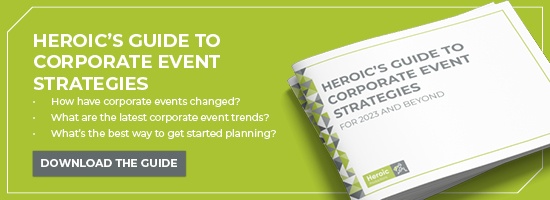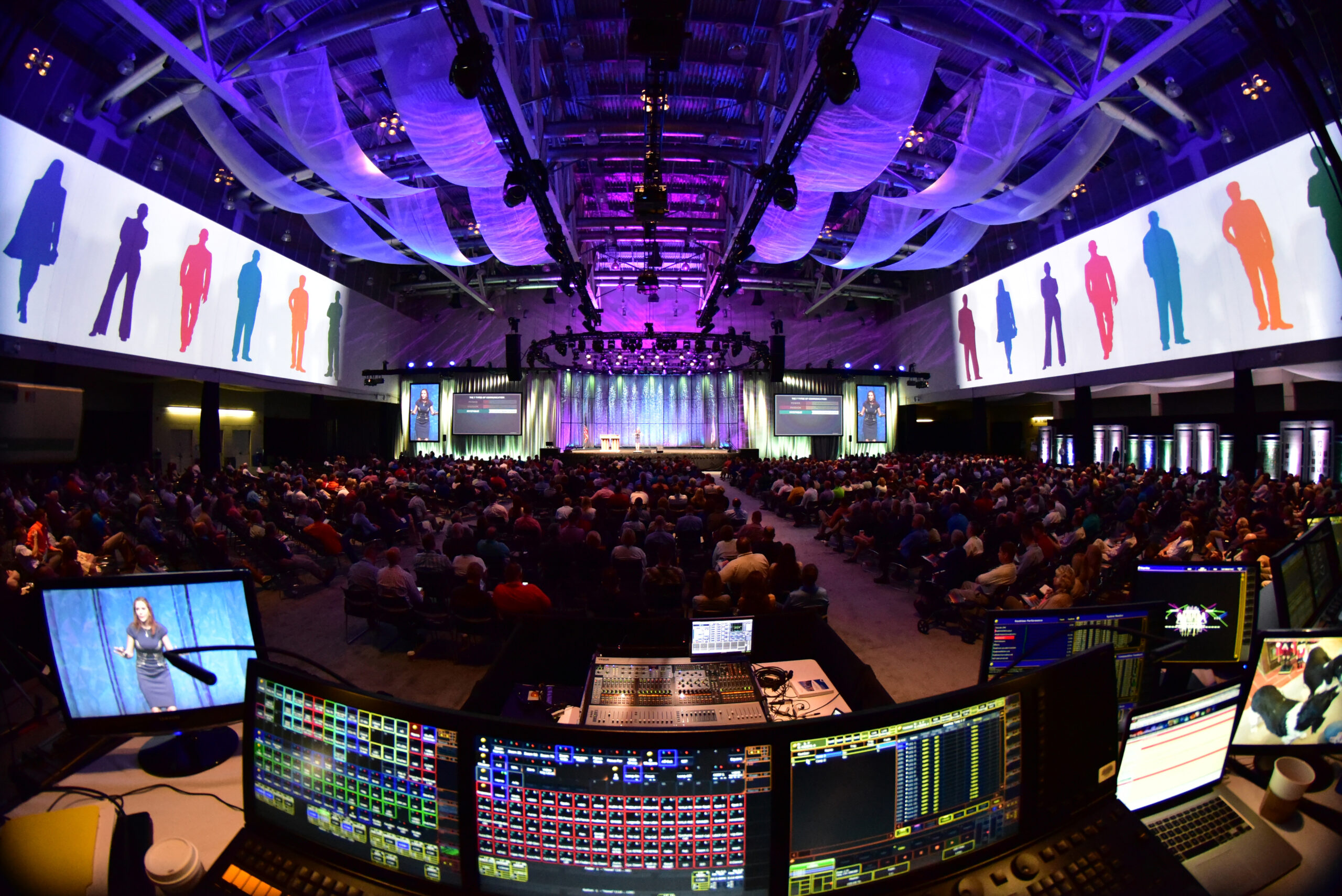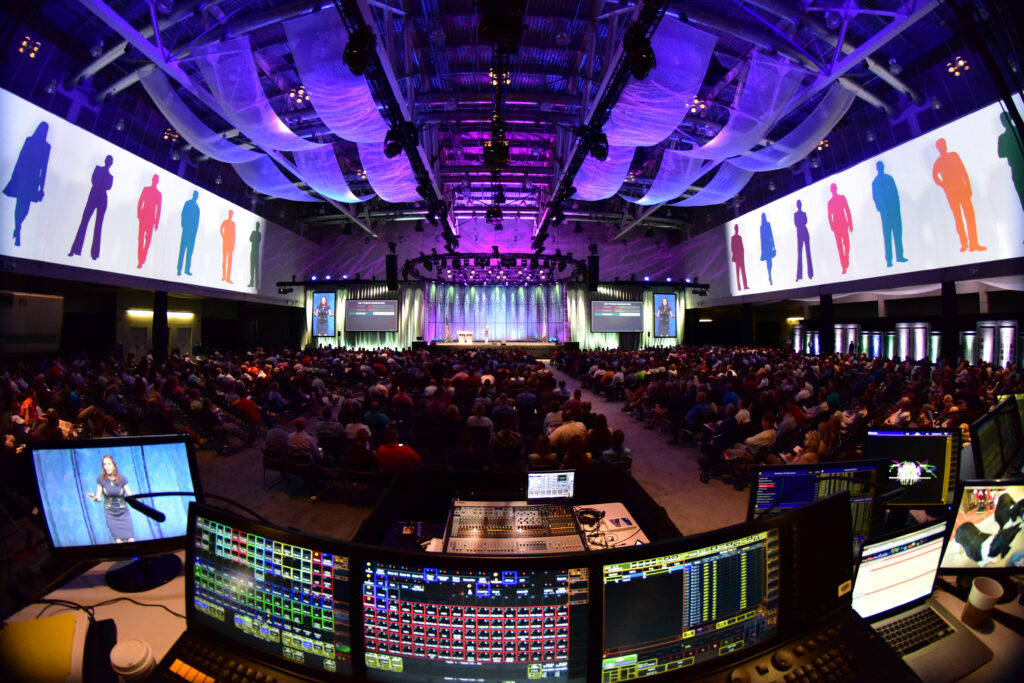Events are powerful tactics to deliver messaging. They’re also meaningful ways to celebrate achievements, train employees, and inspire attendees. Whatever the specific event goals may be, organizations rely on corporate event management teams to strategize, plan, and execute meaningful experiences.
You wouldn’t trust just anyone to plan a million-dollar wedding, and you shouldn’t trust just anyone with your million-dollar meeting, either. Corporate event management comes with all the moving parts of movie production or concert experience. Execution of that level of production requires thoughtful design. Expert event managers bring the advanced talents and strategies needed for producing events, all to surprise, delight, and motivate your attendees into post-event action.

Collaboration is vital
It’s not cost-effective to have your internal staff produce an exceptional event. Tapping an experienced production partner is an excellent and often necessary option when organizations don’t have the staff to execute corporate event management and logistics. Experts know what works. Choosing corporate event management teams with the experience and know-how to execute a successful event and ensure company goals are met can be the difference between meeting organizational objectives and an event that falls flat.
Beyond the need to secure the right venue, technology, catering, and entertainment, event managers bring expert knowledge and a fresh perspective to an organization’s event strategy. They know what’s new and what works and can apply an objective view of a company’s initiatives to build something unique rather than recreating the same event year after year.
Will some of your colleagues prefer to attend the conference from home this year? Corporate event managers have already thought through the unique circumstances that can change the event’s dynamics. They know which vendors have the capabilities to make just about anything happen. Corporate event managers get the right specialists in the room and know the right questions to ask to ensure the job is done the right way and on budget. Use their expertise to get the most out of your event.
Recommended Reading: How to Measure Engagement for Your Next Corporate Experience
Experience matters
There aren’t many event crises that a seasoned event manager hasn’t experienced. The best event managers approach challenges with curiosity, creativity, and an affinity for problem-solving. When a last-minute vendor cancellation could otherwise mean failure, an event manager already has the contact information of other vendors who can get the job done.
Years of experience prepare event managers to handle any issues that may arise. Veteran event management teams approach event productions, understanding that events are living organisms, adapting and evolving to many constantly changing factors. The best event management teams know those factors before they arise, from when your speaker will need a snack to how a venue’s floor plan might affect your attendees’ emotional response to a breakout session.
For example, if you want sparks to fly (in a good way) at your event, your attendees need room to network. Is there an area where your award winners will want to chat after their big moment? Designing solutions for team-building moments to take place is critical, and an experienced event manager has the expertise to identify those important opportunities.
Find Out The Secret Behind a Successful Corporate Event – and How to Get it Right, Every Time
Strategic thinking
Careful logistics execution is crucial to an event’s success and requires superb collaboration. Logistics don’t add up to much if it’s not grounded in a solid event strategy. Event strategy is where it all begins and continues throughout the event.
Corporate event management experts must zoom out to consider the big picture and ask the right questions:
- What are the demographics of the attendees, and how might that inform their experience?
- What’s happening in the company’s culture that might affect the attendees’ perspective?
- Have the attendees faced setbacks that need to be acknowledged, or are they overdue for a celebration?
- Will attendees benefit from a cathartic breakout session after the keynote speaker?
Event strategy should guide all decisions. The answers to the right questions will directly impact each event detail, from the schedule flow to the entertainment. Experienced corporate event managers will create solutions to help organizations meet their goals and objectives.
Event managers don’t just jump in and start building. They develop a vision, determine what success looks like, and then deliver what attendees will need to make an experience worthwhile. This attention to detail is imperative to executing on-strategy.

Let experts be experts
Specific outcomes matter and those outcomes are achieved with thoughtful consideration. Corporate event management teams bring the strategic expertise to design and put together the intricate pieces of an event’s ever-evolving puzzle.
You want your event’s schedule to be planned with purpose. The logistics of your event should be so flawless that no one notices the complexities involved in the event’s planning. And most of all, you want your event attendees to leave with sparks, ideas, and feeling a part of something.
The team here at Heroic can do it all—from strategy to execution. Let’s partner on your next event and put our corporate event management expertise to work for you. Contact us today.






